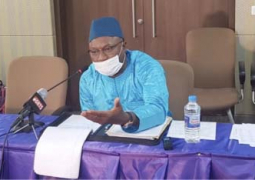A two-day national validation workshop on Baseline survey report on PROGEBE-Areas recently wrapped-up, at the Baobab Holiday Resort in Bijilo.
The project, among others, aims to preserve and strengthen the genetic characteristics of our indigenous/endemic ruminant livestock (N'Dama cattle, Djallonke sheep and West African Dwarf goats) on a sustainable basis, increase their productivity, improve marketing in a favourable institutional environment for the purpose of improving livelihoods and reduce poverty.
In accordance with the provisions for the implementation of the project, baseline surveys were done in the three project areas of the country, namely Kiang West, Nianija and Niamina East Districts, to establish the numbers, distribution of endemic livestock and their roles in household livelihood strategies.
It is in cognisant of this fact that the workshop was convened with the objective to disseminate baseline study findings (including community input) to national stakeholders, identify partner needs for publication, discuss project strategy orientation in light of finding of baseline studies, including preparation of the project mid-term evaluation.
Declaring the workshop open, the Permanent Secretary at the Ministry of Agriculture, Dr. Amadou Sowe, who also doubles as PROGEBE-Gambia Regional Co-coordinator described the validation workshop as timely and relevant. He said his "ministry is in the right direction of what PROGEBE is up to."
A series of presentations at the workshop revealed that between 4 and 11% of households in each district were sampled during the baseline survey. Baseline survey households represented 4.9% of all households in Kiang West, 4.1% in Niamina East and 11.3% in Nianija districts (overall the survey represented 5.6% of all households in the three districts project sites).
The presentations highlighted that the baseline survey applied clustered sampling within a site (10-11 villages, 10 households/villages). This clustering and correlation between households within the same village, according to the presentations, is not incorporated into the site level scaled-up figures.
It also revealed that during their survey, four types of studies were implemented namely a participatory rural appraisal community survey, household survey, market survey and herd & flock surveys.
The two-day workshop was attended by four officials from the International Livestock Research Institute office in Bamako (Mali).



